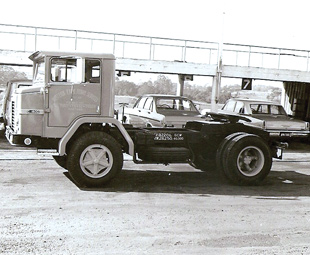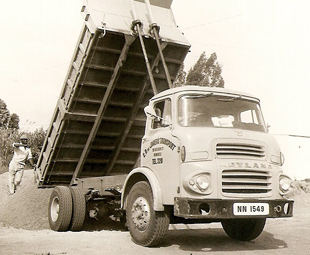Thrown into the deep end

Frank Beeton reminisces about his steep learning curve as a truck salesman in the 60s and 70s, and how formalised commercial vehicle sales training started.
When I first became a truck salesman at the beginning of 1969, my experience in the road transport industry amounted to less than a year as an operations trainee at Natal United Transport – where my duties had been to understudy the operations staff, run backwards and forwards to the Road Transportation Board with permit applications, and ride in the cab of a Fiat 682 between Durban and Johannesburg on several of the inaugural Bakers Biscuits delivery trips.
This was enough to convince me that there was a tad too much physical exercise on the operational side of road transport, and that I should rather try my hand at selling trucks! Fortunately, I had about ten years-worth of interest in commercial vehicles behind me, which probably gave me an advantage over most young men looking to enter the industry; so I was able to talk my way into a sales trainee’s position at Leyland Motor Corporation in Durban without too much trouble.
The interesting thing is that there was so little formal training for truck salesmen in those days. Apart from a few months assisting in the sales administration office, I was left to find my own way around the Road Traffic Ordinance as well as what would later be called “truck selection”. Basically, you were given a company car, a set of brochures, a price list – and told to get on with it! If you didn’t live up to expectations, you were soon invited to move on… Fortunately, I had found very useful allies in people such as Peter White of Busaf Natal and Norman Joseph at L.M. Jennings, who were never too busy to spend time with a young salesman needing help with putting together workable specifications for prospective customers.
Of course, I didn’t make it easy on myself by being fairly creative with my selling activities. At the beginning of 1970 I joined International Harvester; just in time to make acquaintances with the first generation ACCO 1820 from Australia, which was the most basic of trucks. But because of its extremely attractive price and its roots in a “real” truck builder, the ACCO 1820 sold like hot cakes.
However, while my less imaginative colleagues were happy to sell the vehicle in its most common role as a drop-side or tipper, I soon had orders for oddities such as truck-tractors – and even one whopper that needed a tag axle and hydraulic crane to turn it into a delivery unit for a supplier of large concrete pipes! The tractors required sub-frames, fifth wheels and trailer air brake systems, so I had to arrange for the after-market fitment of belt-driven compressors and so on… which kept me busy for some time, although it was a good learning experience.
It was only when I joined General Motors (GM) as truck area manager for the Natal region in 1978 that I received any real formal training in vehicle selection. Together with my colleagues Steve Fox, Bill Rossouw, Tony Barlow, Peter Mogg, Cecil Saunders and Merlyn Koen, most of my first month with GM was spent in Port Elizabeth under the able tutelage of Sammy Sampson.
 We covered the intricacies of “road maps of performance”, driving the trucks we were going to sell – and even stripping and re-assembling engine components. GM’s ground-breaking truck sales training at that time was mostly put together by René van der Merwe, and paved the way for training developments in the industry over the next few decades. The result was a generation of capable, well-informed truck salesmen.
We covered the intricacies of “road maps of performance”, driving the trucks we were going to sell – and even stripping and re-assembling engine components. GM’s ground-breaking truck sales training at that time was mostly put together by René van der Merwe, and paved the way for training developments in the industry over the next few decades. The result was a generation of capable, well-informed truck salesmen.
Thinking back, it’s amazing how little support we received from management and plant personnel in those early days. In many dealerships, sales managers operated in direct competition with their staff, striving to meet their own sales targets. I can remember very few instances where I was accompanied by management on a sales call – either to check on my skills, or to assist in closing a deal. Years later, as a sales manager myself, I spent substantial chunks of time facilitating sales for colleagues in dealerships under my supervision; also conducting many training and information sessions for them.
My own policy was always to maximise my self-education through extensive reading, keen observation, and frequent discourse with people who knew the ropes. At one time, I gained a (probably undeserved) reputation for having an almost encyclopaedic knowledge of truck specifications; but I soon found it risky carrying too much information around in my head. The important thing is to know where to find it when you need it. On that basis I built myself a thirty-year career in the truck industry, met some incredible people, travelled to many parts of the world – and had enormous fun. It’s sad to hear of the difficulties experienced by the industry in attracting suitable young people today… Perhaps this is a legacy from the 1980s, when so few brands participated in a market with severely depleted sales volumes? Hopefully, the erstwhile reputation of truck reps as the “prince of salesmen” will be restored one day soon.
Rear-view Focus is a new column by FRANK BEETON that takes a nostalgic look at the truck and bus world of yesteryear. Visit www.focusontransport.co.za to comment on the column and share your memories with us.
Published by
Focus on Transport
focusmagsa



